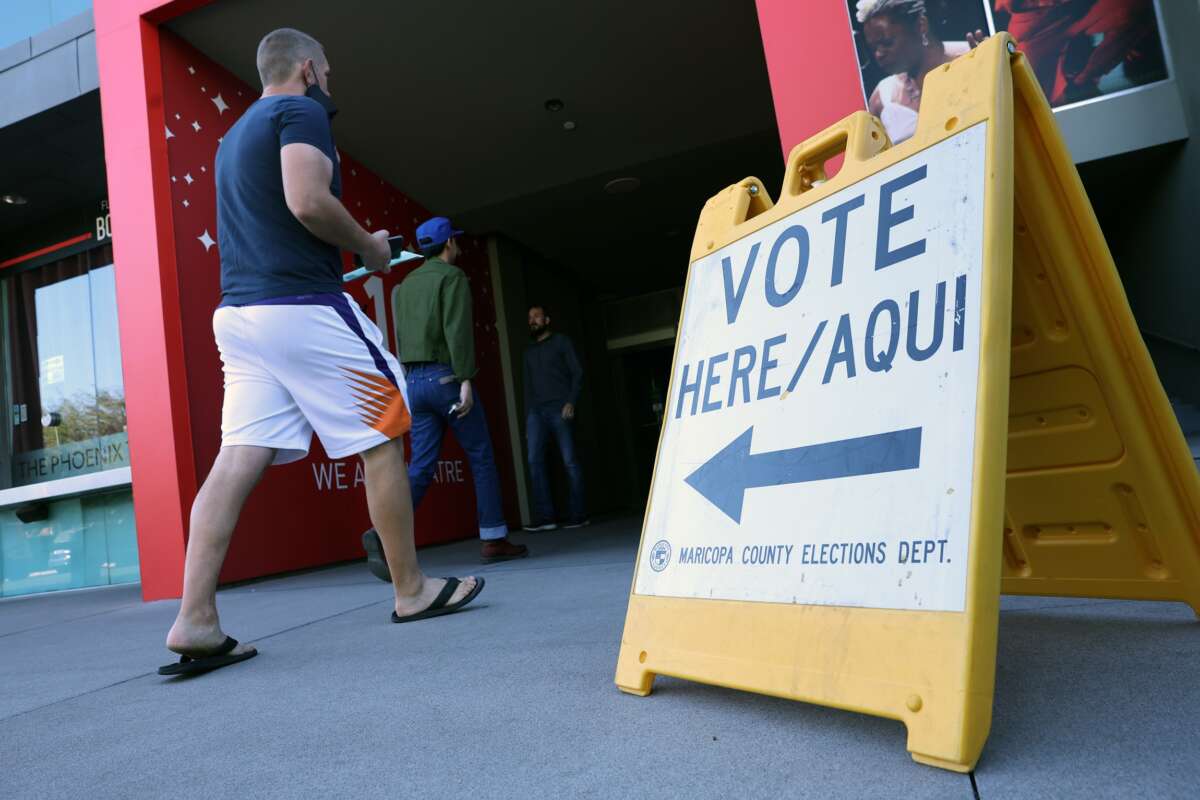Honest, paywall-free news is rare. Please support our boldly independent journalism with a donation of any size.
Last week, Arizona Republican lawmakers passed a measure to place a proposal before voters to amend the state constitution by ending the practice of retention votes for judges and justices appointed by governors.
If approved in November, Senate Concurrent Resolution 1044 would instead allow Arizona governors’ judicial appointments to remain in place during periods of “good behavior,” essentially giving them lifetime appointments without serious checks and balances on their power.
The resolution, if passed, would also affect the outcome of two important State Supreme Court retention elections happening this fall.
Currently, justices of the Arizona Supreme Court are appointed by a governor, after which they serve for about two years in office before they’re subjected to a retention election — a process in which their name is placed on a statewide ballot, and residents of the state give an up-or-down vote on whether they should continue serving for another six years, when the process is repeated.
SCR 1044 upends that process, only allowing for a judge or justice in the state to be removed if a commission finds that they’ve violated a felony-level law, have been convicted of the crime of fraud, or have been found to act dishonestly while in office. Only after that determination has been made can a judge or justice be subjected to a retention election.
The measure passed both Republican-run houses of the state legislature on June 12. Because of state law that stipulates how ballot measures can be placed before voters, it was able to bypass gubernatorial approval from Gov. Katie Hobbs (D).
This fall, two important retention elections are set to occur, featuring justices of the State Supreme Court that ruled in favor of re-implementing an 1864 territorial-era statute that banned abortion in almost all circumstances. Amid immense backlash, that law was subsequently repealed by the state legislature, with just a few Republican lawmakers joining with Democrats to repeal it.
A citizen-driven ballot initiative that would expand abortion rights — allowing the procedure up to the point of fetal viability and granting exceptions beyond that timeframe in cases where a pregnant person’s life or health is at risk — is also set to be voted on in November.
Supreme Court Justices Clint Bolick and Kathryn Hackett King, who sided with the majority opinion in the 1864 statute ruling, are set to face retention elections during that same election. However, if SCR 1044 is passed by voters, the retention votes’ outcomes would be nullified, as the wording of that resolution is retroactive to a week before the election takes place.
State Rep. Alexander Kolodin (R) tried to justify removing the ability of voters to decide on justices by stating that “judicial retention is not really working,” claiming that it is “not a helpful check in [the] system” because of low voter turnout.
Democratic lawmakers disagreed, decrying the measure as an anti-democratic assault on the people’s rights.
The current system “provides the kinds of checks and balances critical to our democracy,” State Sen. Flavio Bravo (D) said.
“People in Arizona are paying attention,” said State Rep. Stephanie Stahl Hamilton (D). “And they know what is at stake, and they want to trust our judicial system.”
“Quite honestly, the abortion decision is not the only one that has had a contentious decision,” Stahl Hamilton added.
Republicans “definitely are ramming [the measure] through” for political reasons, Progress Arizona spokesperson Abigail Jackson said.
During debate on the measure in the State House of Representatives, Rep. Analise Ortiz (D) denounced Republicans for taking away the right of voters “to not retain those Justices who approved the 1864 abortion ban.”
The removal of the retention vote, in anticipation of those justices possibly being removed, “is what authoritarianism looks like,” Ortiz added, before Republicans cut off her speech using procedural rules.
Media that fights fascism
Truthout is funded almost entirely by readers — that’s why we can speak truth to power and cut against the mainstream narrative. But independent journalists at Truthout face mounting political repression under Trump.
We rely on your support to survive McCarthyist censorship. Please make a tax-deductible one-time or monthly donation.
